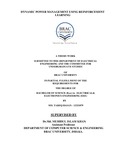Dynamic power management using reinforcement learning
Abstract
Energy consumption of electronic devices has become a serious concern in recent years. Energy efficiency is necessary to lengthen the battery lifetime in portable systems, as well as to reduce the operational costs (e.g. cost of electricity) and the environmental impact (e.g. cooling fan noise) of stationary systems. Optimization in design and utilization of both hardware and software is needed in order to achieve more energy efficient systems. Thesis outcomes show that sleeping is indeed feasible in the LAN and in some cases, with very little impact on other protocols. This thesis conducted in-depth research on different types of power management systems and eventually chose the best fit policy. Dynamic Power Management (DPM) system with reinforcement Q-learning methodology is used here to implement efficiency in LAN card. DPM is a design methodology aiming at reducing power consumption of electronic systems by performing selective shutdown of idle system resources. Moreover, reinforcement learning is a machine intelligence approach that has been applied in many different areas. Q-learning is one of the most popular algorithms that perform reinforcement learning. At last, with the desired outcomes of this thesis work, power management issues of LAN card system were solved effectively.

